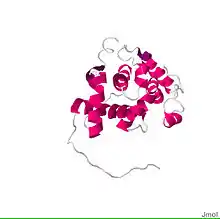Calponin homology domain
Calponin homology domain (or CH domain) is a family of actin binding domains found in both cytoskeletal proteins and signal transduction proteins.[2] The domain is about 100 amino acids in length and is composed of four alpha helices.[3] It comprises the following groups of actin-binding domains:
| Calponin homology (CH) domain | |||||||||||
|---|---|---|---|---|---|---|---|---|---|---|---|
 Solution structure of calponin homology domain of IQGAP1[1] | |||||||||||
| Identifiers | |||||||||||
| Symbol | CH | ||||||||||
| Pfam | PF00307 | ||||||||||
| InterPro | IPR001715 | ||||||||||
| SMART | CH | ||||||||||
| PROSITE | PDOC00019 | ||||||||||
| SCOP2 | 1aoa / SCOPe / SUPFAM | ||||||||||
| CDD | cd00014 | ||||||||||
| |||||||||||
A comprehensive review of proteins containing this type of actin-binding domains is given in.[4]
The CH domain is involved in actin binding in some members of the family. However, in calponins there is evidence that the CH domain is not involved in its actin binding activity.[5] Most proteins have two copies of the CH domain, however some proteins such as calponin and the human vav proto-oncogene (P15498) have only a single copy. The structure of an example CH domain has been determined using X-ray crystallography.[6]
Examples
Human genes encoding calponin homology domain-containing proteins include:
- ACTN1, ACTN2, ACTN3, ACTN4, ARHGEF6, ARHGEF7, ASPM,
- CLMN, CNN1, CNN2, CNN3,
- DIXDC1, DMD, DST,
- EHBP1, EHBP1L1,
- FLNA, FLNB, FLNC,
- GAS2, GAS2L1, GAS2L2, GAS2L3,
- IQGAP1, IQGAP2, IQGAP3,
- LCP1, LIMCH1, LMO7, LRCH1, LRCH2, LRCH3, LRCH4,
- MACF1, MAPRE1, MAPRE2, MAPRE3, MICAL1, MICAL2, MICAL2PV1, MICAL2PV2, MICAL3, MICALL1, MICALL2,
- NAV2, NAV3,
- PARVA, PARVB, PARVG, PLEC1, PLS1, PLS3, PP14183,
- SMTN, SMTNL2, SPECC1, SPECC1L, SPNB4, SPTB, SPTBN1, SPTBN2, SPTBN4, SPTBN5, SYNE1, SYNE2,
- TAGLN, TAGLN2, TAGLN3,
- UTRN, and
- VAV1, VAV2, VAV3
References
- PDB: 2RR8; Umemoto R, Nishida N, Ogino S, Shimada I (September 2010). "NMR structure of the calponin homology domain of human IQGAP1 and its implications for the actin recognition mode". J. Biomol. NMR. 48 (1): 59–64. doi:10.1007/s10858-010-9434-8. PMID 20644981. S2CID 25649748.
- Saraste M, Castresana J (1995). "Does Vav bind to F-actin through a CH domain?". FEBS Lett. 374 (2): 149–151. doi:10.1016/0014-5793(95)01098-Y. PMID 7589522. S2CID 29667309.
- Korenbaum, E.; Rivero, F. (Sep 2002). "Calponin homology domains at a glance". J Cell Sci. 115 (Pt 18): 3543–5. CiteSeerX 10.1.1.608.8653. doi:10.1242/jcs.00003. PMID 12186940. S2CID 38137068.
- Hartwig JH (1995). "Actin-binding proteins. 1: Spectrin super family". Protein Prof. 2 (7): 703–800. PMID 7584474.
- Gimona M, Mital R (1998). "The single CH domain of calponin is neither sufficient nor necessary for F-actin binding". J. Cell Sci. 111: 1813–1821. PMID 9625744.
- Saraste M, Carugo KD, Banuelos S (1997). "Crystal structure of a calponin homology domain". Nat. Struct. Biol. 4 (3): 175–179. doi:10.1038/nsb0397-175. PMID 9164454. S2CID 1428195.